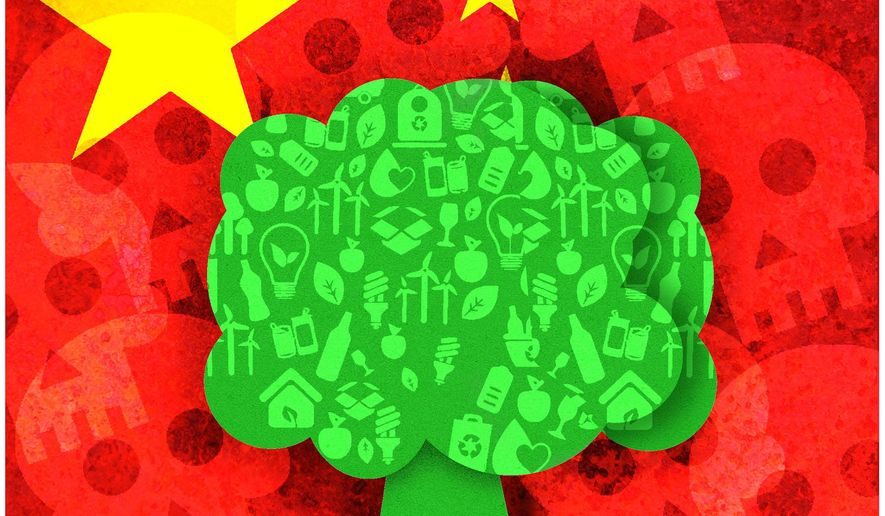OPINION:
Two issues will define the coming era of international relations and determine the direction of our politics for years. The first is the environment. Around the world, populations and their elected politicians are beginning to wake up to the reality and urgency of climate change. Young people across the political spectrum are pressuring politicians to act. For the first time ever, a constructive policy debate is forming as socialist plans like the Green New Deal go up against pro-market solutions like nuclear power, clean investment, and green innovation.
The second all-important issue is China. The Chinese Communist Party has never been a benevolent organization. But in the last year or so, its crimes have become so heinous that they have warranted an international response. China has a long track record of foisting itself on other countries, like Taiwan and Tibet. Recently, it has seized power and imposed draconian totalitarian measures in Hong Kong. It is carrying out a systematic genocide of Uyghur Muslims in Xinjiang. Its refusal to cooperate with Western governments, combined with the undue influence it wields in international governing bodies like the World Health Organization, has cost tens of thousands of lives to date in the COVID-19 pandemic.
Beijing knows exactly what it is doing. When it is not gaslighting Western governments by flat-out denying all wrongdoing — even when it has been caught red-handed on camera — the Chinese government is fortifying its position by churning out positive-sounding rhetoric on climate change. Just a few weeks ago, President Xi Jinping took the world by surprise when he announced his intention to make China a carbon-neutral country by 2060.
The Chinese Communist Party is trying to greenwash its crimes. Despite running by far the most environmentally destructive country in the world, it is shamelessly weaponizing very real concerns over climate change and using them to conceal its equally real malevolence.
“We call on all countries to pursue innovative, coordinated, green, and open development for all,” Mr. Xi told this year’s session of the U.N. General Assembly with a straight face, even though 40% of China’s energy investments through the Belt and Road Initiative are in coal, and 72% of all new coal plants around the world rely on Chinese funding. China produces more carbon dioxide emissions than any other nation — over a quarter of total global emissions — and more than double what the U.S. generates.
China’s counterfactual climate posturing is only possible because of the failure of Western nations, especially the U.S. President Trump’s refusal to acknowledge the importance of fighting climate change or offer any notable policy proposal to it has left a vacuum which China is now moving to fill. Beijing should not be in a position to land blows against the U.S. by criticizing its ‘negative stance’ and ‘poor track record’ on climate change. Yet here we are.
Mr. Trump once said that climate change is a ‘Chinese hoax.’ Fortunately for him, his party, and all Americans, he at least appeared to acknowledge — for the first time — in the presidential debate several weeks ago that climate change is, at least in part, man-made. But he still fails to fully grasp the issue. To date, he has refrained as far as possible, for inexplicable reasons, from confronting climate change head-on.
Combined with his urge to blindly do the opposite of whatever Beijing is concocting, the result is the leader of the free world being played like a fiddle. When the Chinese government engages in hollow virtue-signalling over the environment, Mr. Trump’s response should not be to slip further into denialism. Instead, he should seize the opportunity to place the U.S. at the forefront of environmental innovation. That way, he would beat China, save the planet and reap the immense electoral benefits of embracing innovation-based environmentalism. Polls suggest that 69% of voters would view him more favorably if he did that.
When it comes to the environment, there are no second chances. De-Sinofication — disentangling Western polities and economies from China — is shaping up to be the most important foreign policy project of the century. When it comes to climate change, the way to do that is not to stoop to Beijing’s level and undo years of progress. Instead, the West must call out China’s failures and set an example for the rest of the world by implementing a positive, pro-growth environmental vision. For that, we need strong leadership from the United States.
• Christopher Barnard is the national policy director at the American Conservation Coalition. Jason Reed is the external communications officer at the British Conservation Alliance.




Please read our comment policy before commenting.